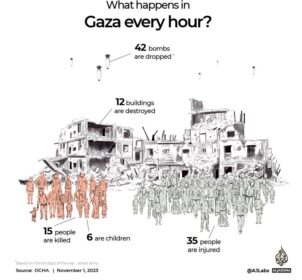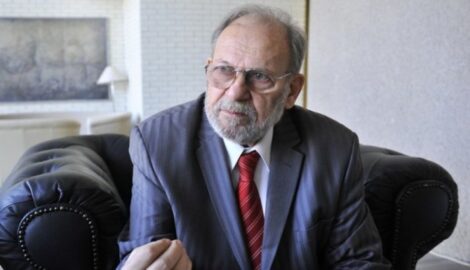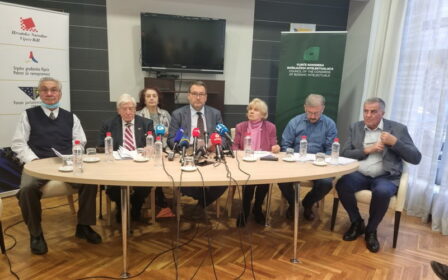In Little Bosnia, a gift from immigrants

St. Louis Bosnians who gathered in the Bevo Mill neighborhood Sunday to salute the groundbreaking of a monument to their motherland were themselves hailed by the president of Bosnia and Herzegovina.
President Zeljko Komsic joined St. Louis Mayor Francis Slay and other dignitaries at a pocket park in the 5000 block of Gravois Avenue where the Bosnian community will construct a “sebilj,” a kiosk-shaped wooden and stone fountain.
The structure will be a replica of the ornate sebilj built in 1753 in the Bosnian capital of Sarajevo.
Komsic was in the country for the U.N. General Assembly last week in New York. He extended his stay to visit St. Louis and other Midwestern cities with large Bosnian populations.
Speaking in his native tongue, Komsic told the crowd of about 200 people that Sunday marked his second trip to St. Louis. On both occasions, he said, he had gone out of his way to query St. Louisans about their impressions of the Bosnian immigrants who have lived among them for the last 20 years.
“Everyone told me they are proud and happy to have Bosnians here,” Komsic said. “And for that, I am proud of you.”
Komsic told Slay that the sebilj was a sign of gratitude from local Bosnians to their adopted city.
Slay told the crowd that it was he who was grateful.
“I am here to express my appreciation and thanks … to the entire Bosnian community for choosing St. Louis, for bringing your families here and for helping to revitalize our neighborhoods,” Slay said.
St. Louis took in thousands of Bosnians who were pushed from the former Yugoslavia in a bloody civil war that, from 1992 to 1995, left nearly 100,000 dead or missing and displaced 1.8 million people.
About 70,000 Bosnians live in the area.
Security was tight Sunday around the groundbreaking scene in the heart of “Little Bosnia,” rejuvenated by its immigrants with restaurants, bars, markets and a newspaper.
A St. Louis Police honor guard escorted Komsic and his contingent, which included two burly bodyguards, to the event. Police blocked off streets around the park during the ceremony.
Komsic, 49, proved himself an affable politician, at one point cracking that the Bosnian dignitaries who had cut a ceremonial ribbon got off lightly.
“You guys left Mayor Slay and I with the tougher job of grabbing shovels and digging the hole,” he pointed out.
After the ceremony, Komsic greeted St. Louis Police Officer Hajrudin Ducanovic, 32, who immigrated to St. Louis from Bosnia in 1994.
“He said, ‘Keep working and you might make captain,’” a smiling Ducanovic said after their meeting.
St. Louis has signed a 100-year lease of the site with the Bosnian community at the fee of $1 a year. Officials said they expect construction to be completed in six months at a cost of about $100,000, with the funds to be raised privately.
Even on bright and breezy afternoons like Sunday, amid smiling Bosnian girls in colorful traditional attire and toasts with shots of the potent plum brandy called Slivovice, thoughts in Little Bosnia are never far from the victims of the bloody purge that sent thousands fleeing their motherland.
As much as the sebilj will be a gift to St. Louis, it will also serve as a memorial to victims such as Danica Komsic, the mother of Bosnia’s president.
On Aug. 1, 1992, a shot from a sniper pierced the window of her 15th floor apartment in a building in Sarajevo and killed her as she sipped coffee. She was 51.
“She was innocent,” the Bosnian president said, nursing a shot of Slivovice and puffing on a cigarette after the ceremony. “So many were innocent. But these people came here and succeeded. What can I say about them? I am so proud.”
Source: stltoday/Paul Hampel.



